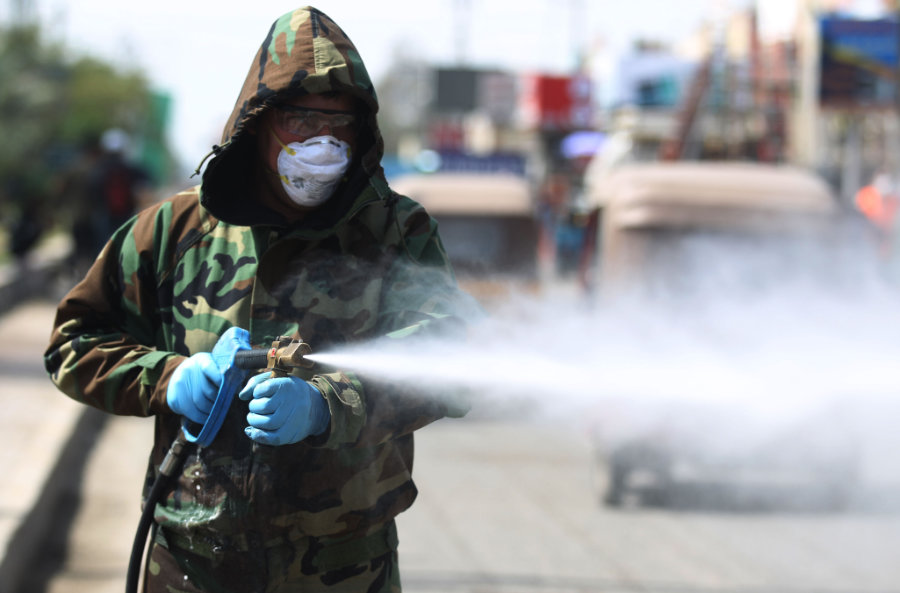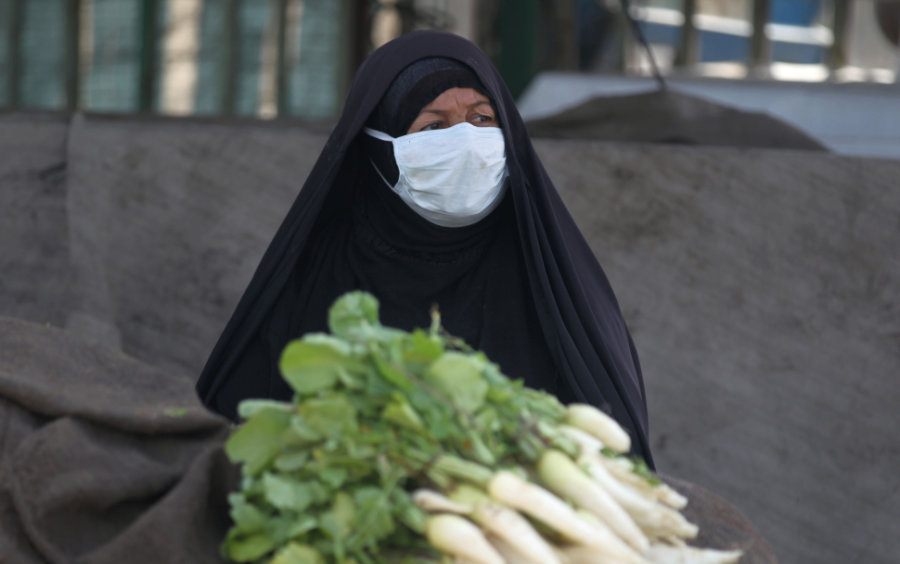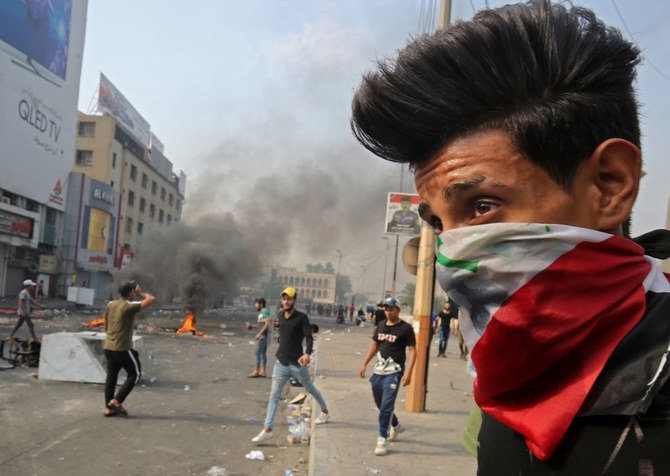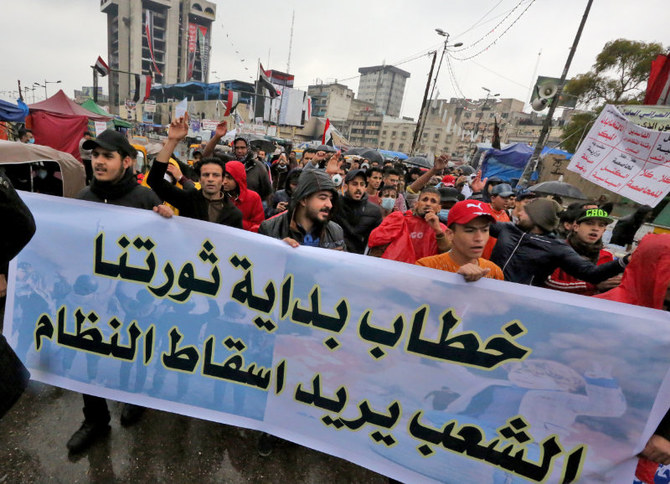ERBIL, Iraqi Kurdistan: As Iraq faces several severe crises simultaneously, some see the makings of a perfect storm that could prove too much for Iraq’s dysfunctional government to handle.
An unchecked outbreak of the coronavirus disease (COVID-19) could prove the proverbial last straw for a country grappling with political turmoil, dwindling oil revenues, deteriorating government services and geopolitical skirmishing.
“Iraq is on the cusp of melting down,” Nicholas Heras, the Middle East Portfolio Manager at The Institute for the Study of War, told Arab News.
“The Iraqi state institutions were already collapsing before the fall in oil prices, and Iraq’s health infrastructure is too much in shambles to handle a big surge in COVID-19 cases.”
The country had reported 506 cinfirmed cases and 42 deaths as of March 29.
Heras attributes Iraq’s particular vulnerability to these crises to the rampant corruption that has prevailed in the country’s post-2003 political establishment.
“Iraq is on the verge of being a failed state,” he said.
The fall in the international price of oil will hit the Iraqi economy hard. Iraq depends on its oil revenues to fund its bloated public sector payroll, which many Iraqis rely upon for their livelihood.
The steep decline in the price of oil means it will not be able to do that.
FASTFACT
In Numbers
13 Iraq’s Fragile States Index rank (out of 178)
5.5% Health expenditure as fraction of GDP
27 Probability of dying under 5 years (per 1,000 births)
68 Life expectancy at birth (Male)
72 Life expectancy at birth (Female)
This closely coincided with another series of crises that have afflicted this country in the first three months of this decade alone.
Iraqis mounted an unprecedented six-month-long protest campaign that began last October against government corruption that has been endemic in the post-2003 political order.
Furthermore, political disputes have left the country without a prime minister since Adil Abdul-Mahdi resigned four months ago amid pressure from protesters.
Three weeks ago, Mohammed Tawfiq Allawi was nominated but failed to secure approval from parliament and was rejected by the protest movement.
Adnan al-Zurfi, former governor of Najaf, is the present prime minister-designate but faces stiff opposition from Iran-backed factions in the Iraqi parliament.
Joel Wing, an Iraq analyst and author of the Musings on Iraq blog, also believes that Iraq is facing a very severe set of crises which he believes spell disaster for the troubled country.
“On the political front, the ruling parties have been unable to agree upon a new prime minister which leaves the government completely in limbo,” he said.
“There is no leadership when that is exactly what the nation needs.”
The collapse in oil prices not only means that the Iraqi government will be unable to pay public sector salaries but is also incapable of meeting other basic costs.
“Because of the government crisis, there is no planning going on for this situation,” Wing said.
“Instead, you get people like the Central Bank chief saying everything is fine, and parliament is sitting on the draft 2020 budget.”
On top of this, Iraq also has to deal with the COVID-19 global pandemic.
Wing echoed Heras when he pointed out that Baghdad lacks any way of dealing with it, given the present political and economic situation.
Even if it does have a plan, he added, it might well lack the money to implement it.
“This is a perfect storm which the country will find it very hard to pull itself out of, especially because all three issues are interconnected,” he said.
Aside from Daesh remnants still operating on its soil and continuing to pose a security threat, Iraq would likely become a major battlefield if war breaks out between the US and Iran.
The US-Iran standoff in Iraq has shown worrying signs of boiling over into open conflict in recent months.

A purpose-built sealed hospital bed built by a resident of Iraq's southern city of Basra to isolate COVID-19 coronavirus disease patients. (Photo by Hussein FALEH / AFP)
After the Iran-backed Kataib Hezbollah Iraqi militia killed a US contractor in a rocket attack in late December, the US retaliated, killing several members of the group’s militia in airstrikes.
Then, on Jan. 8, the US assassinated both Qassem Soleimani, the head of Iran’s Islamic Revolutionary Guard Corps’ extraterritorial Quds Force, and Abu Mahdi al-Muhandis, Kataib Hezbollah’s commander, in a drone strike near Baghdad International Airport.
Iran responded with missile strikes on two US bases, one in Anbar and the other in Iraqi Kurdistan, a few days later, leaving several US troops with brain injuries.
The US did not respond.
Calls for the expulsion of US troops from Iraq intensified by Iran-backed factions in Iraq’s parliament and other Iraqis who fear their country becoming a bloody battlefield in the US-Iran proxy war.
On March 11, Iraqi militia rocket attacks again struck a base with US personnel – killing two American troops and one British troop – and the US once again retaliated by bombing a Kataib Hezbollah target.
However, that airstrike did not seem to inflict any casualties or significant damage against the group.

An Iraqi Civil Defense worker disinfects the streets of Sadr City in Baghdad on March 24, 2020 as a precaution against the coronavirus. (Photo by AHMAD AL-RUBAYE / AFP)
More tit-for-tat exchanges could occur in the near future, which would likely make the situation in Iraq even more volatile.
Lawk Ghafuri, a reporter on Iraqi affairs for the Kurdish news agency Rudaw, argues that the US-Iran tensions in Iraq constitute the most serious crisis facing Iraq today.
“US-Iran tensions are here to stay, as we now see new Iranian-backed groups are rising in Iraq,” Ghafuri told Arab News.
He noted that the US recently began to reposition its troops in Iraq so they can deal with the increasingly deadly threat of rocket attacks from these groups more adequately.
Meanwhile, the coronavirus outbreak is likely to affect Iraq more seriously in the near future.
“From today onward, the coronavirus will also worsen in Iraq as it did in Iran because people are ignoring the threats of this virus,” Ghafuri said.
Turning a blind eye to government restrictions, Shiite pilgrims visited the shrine of Imam Musa Kazim on March 21, sparking fears that the virus will spread more rapidly in the coming days and weeks.
Kyle Orton, an independent Middle East analyst, notes that the multiple crises Iraq face today put the country in a “uniquely precarious position.”
“If the post-2003 Iraqi state is going to give way, now is the moment,” he told Arab News.
That being said, Orton also believes that there is still a chance that “the centre will hold” since the protest movement has been significantly undermined by Iranian-backed paramilitaries and the cleric Muqtada al-Sadr, relieving that primary source of domestic pressure on the Iraqi government.

An Iraqi woman wearing a mask against COVID-19 sells vegetables in the streets of Sadr City in Baghdad on March 24, 2020. (Photo by AHMAD AL-RUBAYE / AFP)
He also doubts that the US is seriously contesting Iranian power in Iraq despite Soleimani’s assassination, which he said it was “an exception” to US President Donald Trump’s rule of not forcibly combating “Iranian imperialism” in Iraq.
“A US-Iran contest for Baghdad could be messy for the system; unhindered Iranian dominance has a short-term systemic ‘stability’, even as it means greater corruption and repression that will surely re-energize the protest movement at some point in the future,” Orton said.
The inherent failures in Iraq’s post-2003 political system may bring about its downfall as it is failing to meet the most fundamental needs of the Iraqi people.
Wing explained that this system mainly consisted of elites who had a greater interest in enriching themselves through the monopolization of state resources.
These elites were able to retain their hold on power by creating patronage networks that they provided lucrative contracts and government jobs to in return for support and loyalty.
“The oil wealth also allowed the ruling parties not to be responsive to the public because it didn’t need it for taxes even though the country has a democratic system,” he said.
“Instead, the elite felt that the people should be dependent upon them because they controlled the state and jobs.”
This arrangement may well be unraveling since the government can no longer generate enough oil revenue to pay its employees.
Wing also noted that this comes as “it is being called on to deal with the public’s health when it has never shown any real interest in the people’s demands, and the parties have become so divided they can’t even decide who will rule.”
If the post-2003 political order finally does implode it’s unclear what’s in store for Iraq in the not-too-distant future.


















